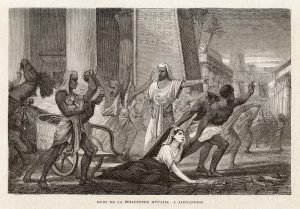Harassing a woman, cornering her, forcing her, murdering her if she resists, is neither new nor uncommon. It has happened, it happens and, if it is not remedied, I fear it will continue to happen; and in multiple contexts, for even in the apparently aseptic world of science or philosophy there are examples of such crimes; the most famous of which is undoubtedly that of Hypatia of Alexandria, whose story has given rise to a multitude of novels, plays and films.

Despite recent studies on the subject, I still prefer the version given by Edward Gibbon in his History of the Decline and Fall of the Roman Empire: “Hypatia, the daughter of Theon the mathematician, was initiated in her father’s studies; her learned comments have elucidated the geometry of Apollonius and Diophantus, and she publicly taught, both at Athens and Alexandria, the philosophy of Plato and Aristotle. In the bloom of beauty, and in the maturity of wisdom, the modest maid refused her lovers and instructed her disciples; the persons most illustrious for their rank or merit were impatient to visit the female philosopher; and Cyril beheld, with a jealous eye, the gorgeous train of horses and slaves who crowded the door of her academy. A rumor was spread among the Christians, that the daughter of Theon was the only obstacle to the reconciliation of the praefect and the archbishop; and that obstacle was speedily removed. On a fatal day, in the holy season of Lent, Hypatia was torn from her chariot, stripped naked, dragged to the church, and inhumanly butchered by the hands of Peter the reader, and a troop of savage and merciless fanatics: her flesh was scraped from her bones with sharp cyster shells, and her quivering limbs were delivered to the flames. The just progress of inquiry and punishment was stopped by seasonable gifts; but the murder of Hypatia has imprinted an indelible stain on the character and religion of Cyril of Alexandria”.
In a simplified reading, the episode can be interpreted as the first repression of the Christian hierarchy against science, because in the first decades of the 5th century, when the herd of the time brutally murdered Hypatia, Alexandria was beginning its scientific decline after seven centuries of splendour, and the science centres were considered the last strongholds of paganism. In fact, a century later, Emperor Justinian ordered the closure of Plato’s Academy and other scientific and philosophical centres dating back to classical antiquity, accused of imparting pagan teachings.
But the case of Hypatia is much more complex; there are, of course, reflections of misogyny and, also, political derivations, as Hypatia was between the opposing sides of Orestes, the Roman prefect, and Cyril, the patriarch – later Saint Cyril. Although I know it is a risky opinion, I have always thought that in the brutal way in which Hypatia was murdered there is a warning about the risks for a woman to decide freely about her life – dedicating it, in this case, to science – instead of submissively opting to be a wife and mother; I am not saying that this was the intention of those who murdered her, but once the deed was done, it remained there as an ever-present threat.

Such episodes are not a thing of the distant past: one need only recall the case of Malala Yousafzai, who was shot repeatedly in the head by a Taliban-linked terrorist group when she was fifteen years old on a bus to school in northern Pakistan because the Taliban had banned girls from attending school. This happened in 2012.
There have always been, there are and, if left without a remedy, there will continue to be. But that remedy cannot be limited to the easy and simple patching up of some law (that will only be a stopgap). The real remedy requires educational, cultural and social changes, a much more difficult, complex, delicate and slow process, but essential if we want to eradicate the male arrogance over women that still permeates the background of society.
Translator’s note: The title of this post refers to the recent case in Pamplona of gang rape by a savage group of men calling themselves “la manada” (the herd). The name has been reused by the media to refer to other similar cases of gang assaults.

Leave a Reply